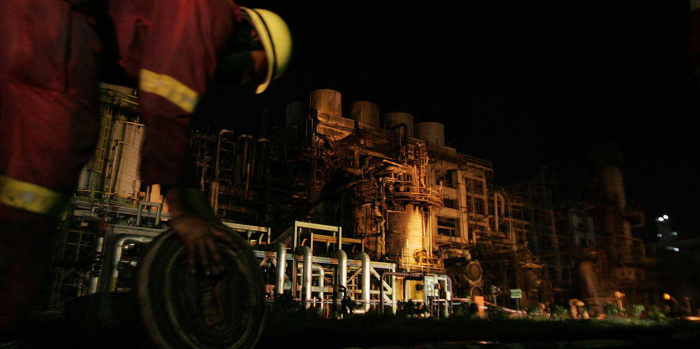US sanctions currently specify that once Russian crude oil is transported to a third country and refined into another product (diesel, gasoline, jet fuel), that product is no longer considered of Russian origin – and it can be sold at world prices, subject to no price cap. This has to change.
The United States has done a great deal to help Ukraine fend off Russia’s full-scale invasion and terrorist tactics since February 2022, including through generous financial and military assistance. In addition, immediately after the invasion, the Biden Administration (and Congress) banned the import of Russian crude oil. But imports of refined products derived from Russian oil were allowed to continue under some conditions. To reduce further the revenue that enables the Kremlin to continue its aggression, now all such imports, without exception, should be prohibited.
During 2022, the US persuaded its G7 partners and the European Union to impose a price cap on exports of Russian oil and refined products. Currently, these exports can be carried, insured, and financed by Western companies only if the price paid is at or below a particular level ($60 per barrel in the case of crude oil). This cap has proved effective at reducing Russian revenue, increasing fiscal pressure on the Kremlin while preventing disruptions to the world oil market.
But recent efforts to lower the cap further have run into resistance. Given the US-EU political impasse on lowering the price cap, banning the import of all Russian-origin gasoline and other refined products into the US is a low cost and logical way to step up the economic pressure on Putin’s regime, while also encouraging US allies to do the same.
US sanctions currently specify that once Russian crude oil is transported to a third country and refined into another product (diesel, gasoline, jet fuel), that product is no longer considered of Russian origin – and it can be sold at world prices, subject to no price cap. This has created highly profitable laundromats for Russian oil in places such as India and Turkey: refineries there buy crude oil at the price cap, and sell refined products at world prices – including to the US, the United Kingdom, and the EU, all of which ban Russian oil but allow products refined from that oil in third countries. The additional profit margin from this arbitrage per barrel obviously varies with world prices, but in 2023 it has likely averaged around $15-20 per barrel, making this business tremendously lucrative.
Most international crude oil and petroleum products move in specialized ships, with cargo size and composition available through proprietary databases. Analysis of these shipments by Global Witness, a non-governmental organization, reveals a salient fact: the US today imports refined products from one “laundromat country,” India, with almost all of it coming from one place – Jamnagar, the world’s largest refining complex.
Reliance Industries Limited, the owner of Jamnagar, is making hundreds of millions of dollars in additional profit because of what it is allowed to do under the price cap. Not surprisingly, in April 2023, 43% of Jamnagar’s seaborne crude imports came from Russia.
Of total US petroleum products imports, 3-5% comes from India, which is roughly the same as pre-pandemic levels. Because the US is a large oil producer, all petroleum imports are small relative to the overall US market (over 20 million barrels of petroleum products per day). In fact, imports from India so far this year are equivalent to only about 15 hours of US total petroleum usage.
Any refinery that processes Russian crude should be banned from selling to the US. This is a simple approach that would be easy to enforce. The effect on gasoline and other prices in the US would be minimal, particularly as substitution across alternative international suppliers can easily be arranged.
Jamnagar (and others) can still refine Russian crude, but they will need to find other markets for their refined product. This will further stigmatize trade with Russia, putting additional downward pressure on the price of its crude – and reinforcing the goal of the original US embargo and the G7-EU price cap arrangement. Because Russia has a pressing need for foreign exchange and a short-run marginal cost of production of less than $20 per barrel, reducing the price paid to Russia will not lower its oil exports.
There is growing support on Capitol Hill for banning all Russian-origin petroleum imports, in large part because this would also encourage both the EU and the UK to move in the same direction. Both those jurisdictions have more exposure to refined products from laundromat countries and will be concerned about the impact on their domestic markets (including inflation).
As Russia’s aggression against Ukraine continues, it is completely illogical to support Ukraine on all possible fronts while also allowing Russia to earn large profits on its oil exports. Most of Russia’s foreign-exchange earnings now come from the sale of oil, and that will be true for the foreseeable future. Irrespective of who controls the Kremlin next year or 20 years from now, Russia is not likely to become a stable, peace-loving democracy that respects international borders. The West needs a long-term strategy of economic containment, within which Russia can export crude oil but only at a price that drops with every act of aggression.
Simon Johnson, a former chief economist at the International Monetary Fund, is a professor at MIT’s Sloan School of Management, a co-chair of the COVID-19 Policy Alliance, and a co-chair of the CFA Institute Systemic Risk Council. He is the co-author (with Daron Acemoglu) of Power and Progress: Our Thousand-Year Struggle Over Technology and Prosperity (PublicAffairs, 2023).
Oleg Ustenko has been Economic Adviser to Ukrainian President Volodymyr Zelensky since May 2019.
More about:
















































